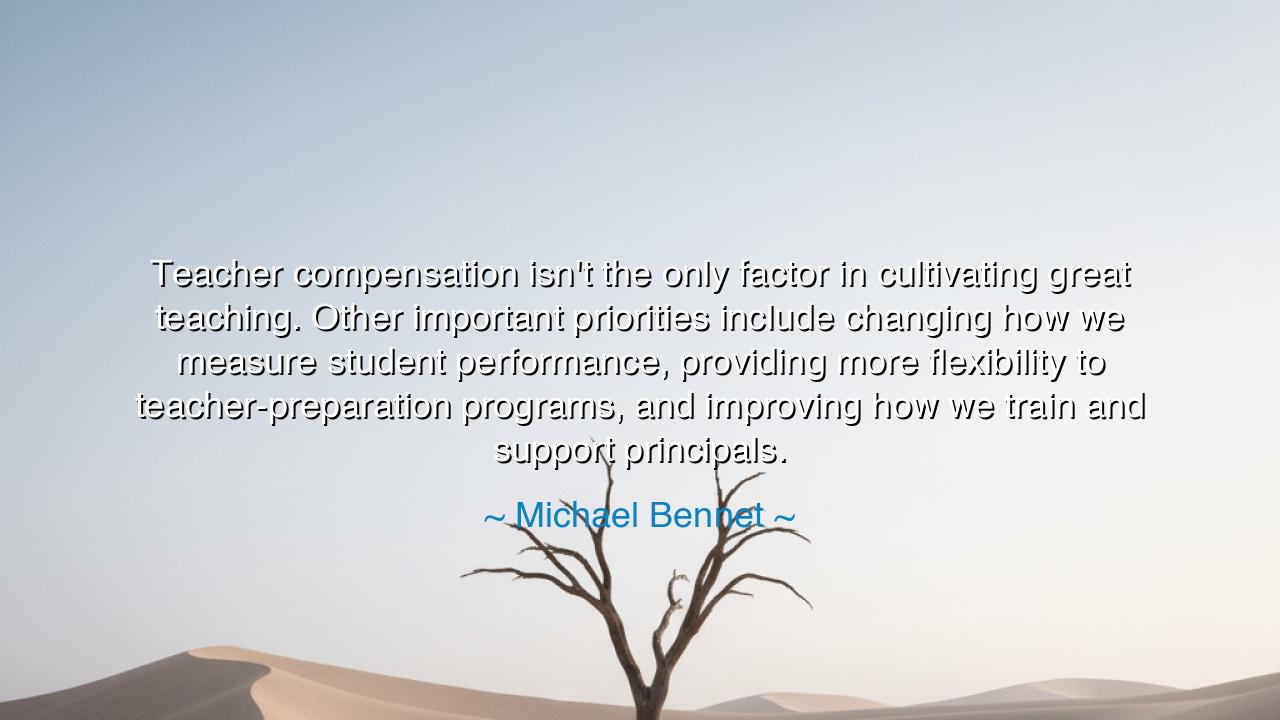
Teacher compensation isn't the only factor in cultivating great
Teacher compensation isn't the only factor in cultivating great teaching. Other important priorities include changing how we measure student performance, providing more flexibility to teacher-preparation programs, and improving how we train and support principals.






The American statesman Michael Bennet, himself once a superintendent of schools before becoming a senator, spoke with the authority of experience when he declared: “Teacher compensation isn’t the only factor in cultivating great teaching. Other important priorities include changing how we measure student performance, providing more flexibility to teacher-preparation programs, and improving how we train and support principals.” In these words, he lifts the discussion of education beyond mere wages, and places it within the broader framework of vision, leadership, and renewal.
The first truth he proclaims is that while compensation is important, it alone cannot build an excellent system of teaching. Money may attract teachers, but it does not sustain them in the long nights of grading, in the patient shaping of restless minds, in the quiet endurance of disappointment. A teacher’s greatness comes not only from material reward but from an environment that supports, guides, and strengthens them in their sacred task. Just as a soldier needs not only a sword but also discipline, training, and leadership, so too does a teacher need more than a paycheck—they need the structure of a healthy, thriving school.
Bennet also highlights the need to transform how we measure student performance. For too long, numbers on a page and the tyranny of standardized tests have overshadowed the living growth of children. True education is not merely the ability to fill bubbles with pencils, but the awakening of creativity, curiosity, and character. If we measure only what is easy, we will miss what is essential. A wise system must look beyond test scores to see the whole child, the spark of potential, the journey of learning rather than the single snapshot of an exam.
Furthermore, Bennet calls for flexibility in teacher-preparation programs. Just as no two students are alike, so no single mold should constrain all who are called to teach. Some may come with a background in science, others in art, still others from the lived experiences of struggle and resilience. To honor these differences, programs must adapt, cultivating teachers not as identical replicas, but as unique guides shaped for diverse classrooms. In this way, education itself becomes more human, more alive, more powerful.
He also reminds us of the often-overlooked role of principals. These are not merely administrators of buildings, but the captains of ships, steering schools through the storms of budget cuts, policy changes, and social upheavals. To train and support principals is to ensure that teachers have leaders who inspire rather than suffocate, who encourage rather than demand blindly. When a principal is wise, compassionate, and visionary, the entire school flourishes; when they are harsh or untrained, the light of even the finest teachers may be dimmed.
History gives us a mirror. In the days of the Gurukuls of ancient India, the teacher, or guru, was supported not by wealth alone, but by a system that revered knowledge, cultivated mentorship, and sustained both teacher and student with reverence. In contrast, when societies reduced teachers to mere functionaries—whether in decadent Rome or in industrialized systems that valued production over wisdom—the vitality of learning withered. Thus, Bennet’s words echo timeless truths: to strengthen education, one must strengthen not only the wage, but the very soul of the system.
The lesson for us is clear. If we wish to cultivate greatness in education, let us look beyond the surface. Let us advocate for fair wages, yes, but also for better ways to measure growth, more flexible paths to teaching, and stronger leaders in every school. Let us honor teachers not only with pay, but with trust, training, and vision. Let parents and citizens alike understand that the future of nations rests not only on budgets, but on the wisdom to nurture schools as gardens of life.
Practically, we may act by supporting reforms that value the whole child, by mentoring new teachers with patience, by lifting principals into the role of servant-leaders, and by honoring those who labor daily in classrooms. And above all, let us remember that education is not the work of teachers alone—it is the covenant of an entire people. For in the end, as Bennet declares, great teaching is cultivated not by one factor, but by many, woven together into a fabric strong enough to carry the hopes of generations.






AAdministratorAdministrator
Welcome, honored guests. Please leave a comment, we will respond soon